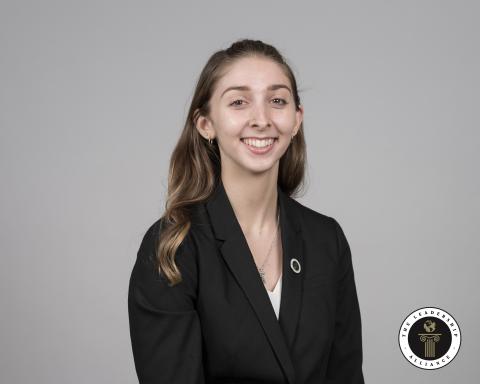Double Dipping in Research: Pursuing Bat Bioacoustics and Preparing for Grad School
As my time here at UNH comes to an end, I reflect on experiences that shaped my journey to where my path has led me today. I never thought that I would be ending my undergraduate career in such prestigious standings with a robust set of skills. As I begin my journey of pursuing a higher education degree at Johns Hopkins, I am grateful for some key opportunities that allowed me the space to grow my abilities and feel confident going forward.

The Ecological Acoustics and Behavior (EAB) lab at UNH has been an integral part of my scientific evolution. Dr. Laura Kloepper, the principal investigator of the EAB lab, has been an incredible research mentor from the first day I started working on my independent research project investigating the soundscape of a dense emergence of bats. It was with her guidance and support that I poured countless hours of hard work into this project and learned the value of presenting my findings to different communities. This project allowed me not only to learn the importance of the scientific process and scientific communication, but also prepared me well to pursue a higher education degree.
Independent Research
The guiding question of my work was: How does the bat swarm soundscape change based on a bat’s location within the swarm? I aimed to investigate how bat vocal behavior was changing based on whether they were in the middle or the periphery of the swarm. This research was completed through an independent research project over the course of 15 weeks of the Fall 2022 semester. During this time, I maintained a workflow that was largely self-motivated and self-structured. In order to give myself the structure that I needed, I made self-imposed deadlines to get things done in a timely fashion. I dedicated specific chunks of time to read up on current literature, organize data, record findings, complete data analysis, create visuals of my results, and of course leave extra room for unexpected issues. Conducting research independently means that you have a duty as a scientist to adhere to protocols that will produce the soundest science and it is important to remember to maintain the integrity of your findings. The freedom of conducting my own work independently showed me how to manage my time appropriately, evaluate my own work objectively, and helped me develop self-discipline.
Presenting at a National Conference
After all the hard work for my project was done, I was fortunate enough to present at multiple local symposia before presenting at a national conference, the Acoustical Society of America’s 184th Meeting in Chicago. I first prepared an oral presentation to present at UNH’s 2023 Northeast Regional Environmental Acoustics Symposium. This symposium was the first time I gave a talk to so many people on a scientific research project. I was nervous that I was going to forget important aspects of my work or get stuck if I lost my place. To minimize these fears, I practiced my presentation many times to myself, as well as with my lab members during lab meetings right before the symposium, to get feedback. I also presented my work in the form of a poster presentation at UNH COLSA’s Undergraduate Research Conference. This high amount of repetition helped me develop a speech that became second nature. At my first oral presentation, I was able to present my work to a big group of people to get all the nerves out. This combination of talks gave me the confidence that I knew my project intimately and that I could tackle a variety of questions that may be asked.
With this experience under my belt, I was awarded a Research Presentation Grant from the Hamel Center for Undergraduate Research to fly to Chicago and attend the Acoustical Society of America’s 184th Meeting along with attendees from all over the country. While attending this conference, I took advantage of the opportunity to network with acousticians from all kinds of subject areas. From speech pathologists to musicians, I was able to learn about how other industries use and study sound. When it came time for my oral presentation, I was nervous about presenting to a room full of well-known scholars in the field of bat research. But I had rehearsed enough that I knew my talk like the back of my hand. After a deep breath, and a few shaky first words, my autopilot took over and I presented my work confidently. It was such a relief to be approached by so many people afterwards with questions and see their interest in learning more.
What’s Next?
The opportunities offered at UNH helped me develop into a sophisticated scientist with a skillset that will serve me long into my career. Looking toward my future, due to these key experiences, I feel exquisitely prepared as I continue my research at Johns Hopkins on bat behavioral acoustics and neuroscience.
